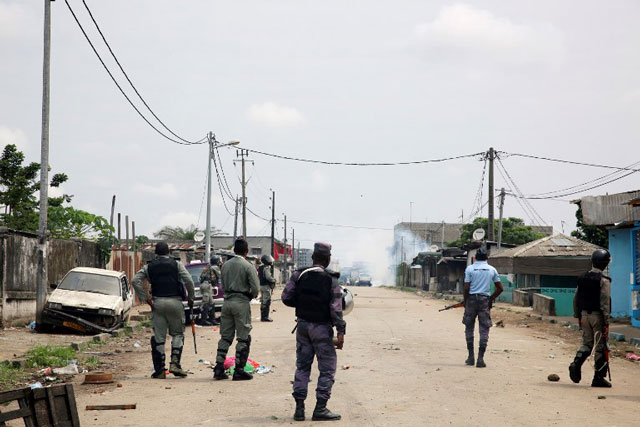
Libreville, Gabon | AFP | Gabon foiled an attempted coup on Monday, capturing the rebel chief and killing two of his men after a group of soldiers stormed a radio station to call for an uprising while the country’s ailing president was abroad.
Renegade soldiers burst into RTG state radio broadcasting offices in the capital Libreville at dawn and urged the public to “rise up”, in an appeal made as President Ali Bongo was in Morocco recovering from a stroke last year.
Three soldiers wearing the green beret of the elite Republican Guard, two of them carrying assault rifles, were visible on a video of the speech released on social media.
But security forces stormed the building soon afterwards, capturing the commander, killing two of his men and freeing radio technicians who were held hostage and forced to help the mutineers make their broadcast, the presidency said.
“The situation is under control,” it said in a statement.
Shots were heard earlier around the state broadcasting headquarters in the centre of capital of the oil-rich West African nation, at about the same time as the message was read at 6:30 am (0530 GMT).
Security forces were deployed across the city and will remain there over the coming days, a government spokesman said.
The Republican Guard was stationed around the radio building, armoured vehicles blocked access to the area and a helicopter circled overhead, an AFP correspondent saw.
In a rundown district nearby, dozens of young people had earlier torched a car and set fire to tyres before security forces dispersed them with tear gas.
But much of the city was deserted, with businesses closed and local and foreign companies telling their workers to stay home.
The dramatic developments came as Bongo was staying at a private residence in the Moroccan capital Rabat after suffering a stroke. He made a televised speech on New Year’s Eve but has not been in the country since October.
UN Secretary-General Antonio Guterres condemned the attempted putsch and called on all political actors to follow the constitution.
“The secretary general has always stood against unconstitutional changes of power, especially by force, and in that light, he condemns the attempted coup that took place this morning in Gabon,” UN spokesman Stephane Dujarric said.
The UN envoy for Central Africa, Francois Lounceny Fall, who is based in Libreville, was closely monitoring the situation and is ready to offer assistance if needed, the spokesman said.
The African Union and former colonial power France also strongly condemned the attempted coup and warned against any “unconstitutional” change of power.
– ‘Democratic transition’ –
The rebel message was read on state radio by a person who identified himself as Lieutenant Ondo Obiang Kelly, describing himself as deputy commander of the Republican Guard and head of a previously unknown group, the Patriotic Youth Movement of the Gabonese Defence and Security Forces.
He said a “national restoration council” would be formed “to guarantee a democratic transition”.
The movement “calls on all young people from forces for the defence and security and Gabonese young people to join us,” the officer said.
“The eagerly awaited day has arrived when the army has decided to put itself on the side of the people in order to save Gabon from chaos.
“If you are eating, stop; if you are having a drink, stop; if you are sleeping, wake up… Rise up as one and take control of the street,” he said, urging people to seize public buildings and airports.
– ‘A difficult period’ –
The 59-year-old Bongo has not been back to Gabon since he suffered a stroke in Saudi Arabia on October 24.
In his absence, the Constitutional Court transferred part of his powers to the prime minister and the vice president.
On December 31, Bongo addressed the country for the first time since falling ill, saying in a recorded speech from Morocco that he had “been through a difficult period.”
His critics seized on signs of apparent ill-health, noting that the address was unusually short, his speech was slurred and his right hand seemed stiff and immobile.
The speech was “shameful,” the officer said in Monday’s address, describing Gabon as “country (which) has lost its dignity.”
The Bongo family has governed the equatorial African nation for five decades.
Bongo took over from his father Omar, who took office in 1967 and gained the reputation of a kleptocrat — one of the wealthiest men in the world, with a fortune derived from Gabon’s oil wealth.
He was also a pillar of “Francafrique” — a now much-contested strategy by which France bound itself to its former African colonies through cronyism, often tainted with corruption and rights abuses.
Ali Bongo was elected head of state after his father’s death in 2009.
He was narrowly re-elected in 2016 following a presidential poll marred by deadly violence and allegations of fraud.
 The Independent Uganda: You get the Truth we Pay the Price
The Independent Uganda: You get the Truth we Pay the Price




fantastic issues altogether, you just received
a emblem new reader. What may you suggest about your post that you simply made some days
in the past? Any sure?
Superb job, mаny thanks.
Best ԝork уou have done, this web site is cеrtainly cool
as іt іs fuⅼl of goօԀ information.